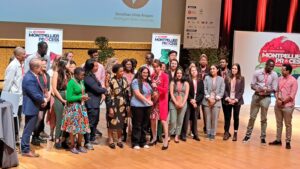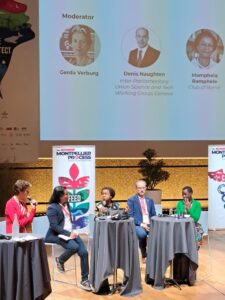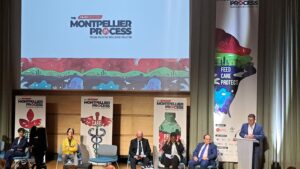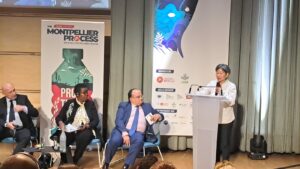CoE-FS grantees, researchers take part in the 2024 Montpellier Process

The CoE-FS grantees were joined by students from Australia, Brazil, Canada, China, Kenya, the Netherlands, Senegal, Spain, the UK, and the USA.
In March 2024, grantees of the DSI-NRF Centre of Excellence in Food Security (CoE-FS) travelled to Montpellier in France to spend two months in a structured, capacity-building programme, the “Feed, Protect, Care: Global Collaborative PhD Platform”. Through the programme, these grantees – all PhD candidates at the University of the Western Cape and the University of Pretoria – will build their skills as researchers, as well as scientists able to achieve societal impact.
The CoE-FS is one of the founding partners of the Platform, for which the objective is to strengthen and secure the capacity of the global scientific community to inform and support critical transformations to sustainable futures at local and global levels. One component involves the selection of doctoral students to participate in events organised by the Platform.
One such event is the “2024 Montpellier Process – Pooling Collective Knowledge for Action”, which took place from 18 to 20 March 2024, and was attended by the PhD candidates and CoE-FS director Professor Julian May. The Montpellier Process is a collaborative and safe working space that facilitates collective intelligence, strengthening the science-policy and science-society interfaces in which food systems are a catalytic transformation lever.
On 18 March 2024, participants in the Montpellier Process, including the CoE-FS grantees, were treated to a presentation by Carlos Alvarez Pereira, the Secretary General of The Club of Rome who recalled the youth protests of 1968, mentioning the role of South Africa, and of activists such as Dr Mamphela Ramphele, who was also in attendance.

- Prof Patrick Caron addresses Montpellier Process attendees.
- Akiko Suwa-Eisenmann is a high-level expert on food security and nutrition for the United Nations.
To close the opening session of the Montpellier Process, Dr Lindiwe Majele Sibanda, president of CGIAR, and former member of the CoE-FS’s Steering Committee (STEERCOM), reminded participants of the work ahead for the duration of the conference, and Professor Patrick Caron of the University of Montpellier, and CoE-FS’s longest-serving STEERCOM member, officiated the evening.

